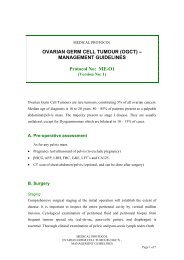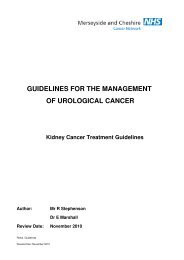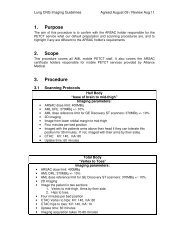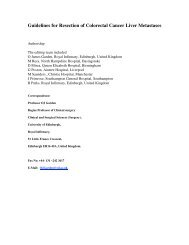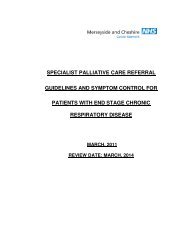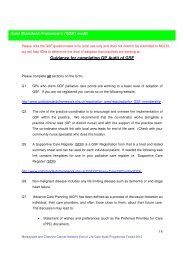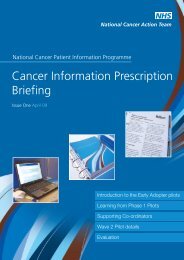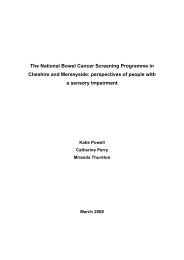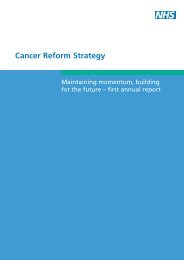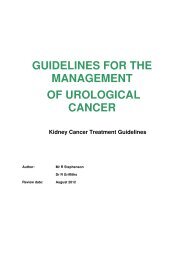Cancer Reform Strategy - NHS Cancer Screening Programmes
Cancer Reform Strategy - NHS Cancer Screening Programmes
Cancer Reform Strategy - NHS Cancer Screening Programmes
- No tags were found...
Create successful ePaper yourself
Turn your PDF publications into a flip-book with our unique Google optimized e-Paper software.
CHAPTER 5: LIVING WITH AND BEYOND CANCER 81●●Psychological assessment and support; andTo arrange surveillance investigations such asblood tests, CT scans and endoscopies.5.64 In practice, follow up consultations areoften brief, are conducted by relatively juniordoctors and may not meet patients’ needs.5.65 Alternatives to hospital follow up havebeen successfully introduced in some places andfor some cancer types. For example:●●Reducing the frequency of follow up insecondary care, meaning less visits tohospital;Transferring follow up to primary careaccording to predetermined protocols, sothat appointments can happen closer tohome;●●●●●●●●●Education, self care and expert patientprogrammes;Proactive case management, for example bytelephone contact;Drop in centres for peer support;Automated surveillance systems to ensuretests are undertaken at appropriate intervals;Patient reports of wellbeing using electronictechnology such as mobile phones;Provision of rehabilitation programmes;Psychological and spiritual support;Back to work support;Access to financial and benefits advice;●●Nurse led follow up (in hospital or primarycare); andReleasing patients from routine follow up,but giving them direct access back to theclinical team in relation to agreed “triggers”.5.66 Further detailed consideration now needsto be given to the services needed by survivorsof cancer. The National <strong>Cancer</strong> Director willlead a new National <strong>Cancer</strong> SurvivorshipInitiative to take this forward in partnershipwith Macmillan <strong>Cancer</strong> Support and othercancer charities. This initiative will requirecollaboration between clinicians working inprimary and secondary care, social care services,service users and patients and the voluntarysector. It will also link closely to ongoing workfor patients with other long term conditions.5.67 The National <strong>Cancer</strong> Survivorship Initiativewill consider a range of approaches tosurvivorship care and how these can best betailored to meet individual patients’ needs.These include:●Clinical follow up by hospital doctors, nursesand/or GPs (such as to detect recurrence andmonitor late effects of treatment);●●Nutritional advice; andOngoing support for carers.5.68 The National <strong>Cancer</strong> Survivorship Initiativewill also look in more detail at best practiceregarding care planning for survivorship. This islikely to include formal assessments of apatient’s needs and preferences for care at thecompletion of treatment and what role thepatient wishes to take in managing their owncare.5.69 As part of this work, Macmillan <strong>Cancer</strong>Support will host a think tank event,Making the <strong>Cancer</strong> Survivorship Agenda aReality, in March 2008. The key outcomes ofthe event will be: to identify key policywork streams and priorities; to agreestakeholder involvement for each of thepolicy work streams; and to produce areport outlining the outcome of the eventfor wider circulation. The event will beco-chaired by the National <strong>Cancer</strong> Directorand the CEO of Macmillan <strong>Cancer</strong> Supportand will involve patients, healthprofessionals, the voluntary sector,academics, research experts, internationalexperts and the government.



